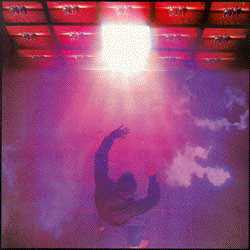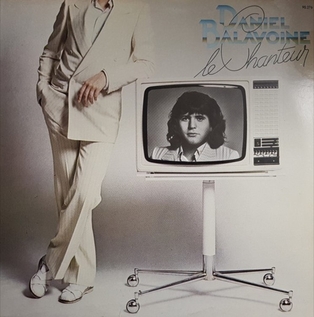
Icehouse are an Australian rock band, formed in Sydney in 1977 as Flowers. Initially known in their homeland for their pub rock style, the band later achieved mainstream success playing new wave and synth-pop music and attained Top 10 singles chart success locally and in both Europe and the U.S. The mainstay of both Flowers and Icehouse has been Iva Davies supplying additional musicians as required. The name "Icehouse", adopted in 1981, comes from an old, cold flat Davies lived in and the strange building across the road populated by itinerant people.

Daniel Xavier-Marie Balavoine was a French singer and songwriter. He was hugely popular in the French-speaking world in the early 1980s; he inspired many singers of his generation such as Jean-Jacques Goldman, Michel Berger, who was his closest friend, as well as the Japanese pop-rock group Crystal King. Balavoine was a part of the original cast of the rock opera Starmania in 1978, which was written by Berger.

Shaking the Tree: Sixteen Golden Greats is a compilation album by the English rock musician Peter Gabriel. It was released in 1990 as Gabriel's first career retrospective, including songs from his first solo album Peter Gabriel (1977), through Passion: Music for The Last Temptation of Christ (1989). It was remastered with most of Gabriel's catalogue in 2002. The vinyl version of the album is called Shaking the Tree: Twelve Golden Greats.

Tones is the first studio album by guitarist Eric Johnson, released in 1986 through Reprise Records; a remastered edition was reissued on February 23, 2010 through Wounded Bird Records. Both "Zap" and "Emerald Eyes" are re-recordings from Johnson's then-unreleased 1978 debut album Seven Worlds, which eventually saw an official release in 1998. The instrumental "Zap", released as a B-side to the single "Off My Mind", was nominated for Best Rock Instrumental Performance at the 1987 Grammy Awards.

Black and White in a Grey World is the third album by Leslie Phillips, released in 1985 on Myrrh Records. Phillips picked up her first Grammy Award nomination for Best Gospel Performance, Female at the 28th Grammy Awards. The album peaked at number 13 on the Billboard Top Inspirational Albums chart.

Beat the System is the seventh studio album of the Christian rock band Petra. It was released in late 1984.

Measure for Measure is the fourth studio album by the Australian rock/synth-pop band Icehouse, released in April 1986 in Australia by Regular Records and in the United States by Chrysalis Records. It was one of the first three albums to be recorded entirely digitally.

Jermaine Jackson is the tenth studio album by United States singer-songwriter Jermaine Jackson, released in 1984. It was his debut album with Arista after leaving Motown. The album features then-unknown Whitney Houston and his brothers Michael, Tito and Randy.

Enchanted is the sixth studio album by the British singer/songwriter Marc Almond. It was released on 7 August 1990 and reached number 52 on the UK Albums Chart and number 81 on the Dutch albums chart. Enchanted includes the singles "A Lover Spurned", "The Desperate Hours" and "Waifs and Strays".

Vendeurs de larmes is the sixth studio album by French singer Daniel Balavoine, that was released in April 1982 and was a success with sales of over 600 thousand copies in France. It was also a new revival of French pop rock, and the single "Vivre ou survivre" from the album proved to be one of the greatest hits for Balavoine.

Stéphanie is the second and final studio album released by Princess Stéphanie of Monaco. The album was released on 30 July 1991 through the WTG Records in the United States, and the Epic Records in Europe. It was released five years after her successful debut album Besoin. Stéphanie met with disappointing sales — it sold only 3,500 copies in the United States — and negative reviews. In 1992, Stéphanie ended her music career.

Gravity is the 53rd studio album by American musician James Brown. The album was released on September 15, 1986, by Scotti Bros. Records. It was largely written and produced by Dan Hartman and Charlie Midnight, the authors of the album's previously released hit single "Living in America", which had reached #4 on the Billboard Hot 100 and was prominently featured in the film Rocky IV. It was Brown's first album for the Scotti Brothers record label.

Stephanie Mills is the tenth studio album by the American R&B singer Stephanie Mills, released in 1985 on MCA Records. Following her last release I've Got the Cure on Casablanca Records, Mills self-titled new album was the first release upon signing a new recording contract with MCA Records.

Looking at You is the fourth solo studio album by the English singer and multi-instrumentalist Chaz Jankel. It was originally released in 1985, on the label A&M. It was his last solo album until 2001's Out of the Blue, as well as his last to be released on A&M, after Jerry Moss, the recording executive of A&M, rejected the release of his fifth album and terminated his recording career with the label in the same year.

Love Season is the debut studio album by jazz pianist Alex Bugnon. It was released in 1988 through Orpheus Records. Recording sessions took place at Presence Studios in East Haven, Connecticut, at Unique Studios, 39th Street Music Studio and Rawlston Recording Studio in New York City. The production was handled by Rahni Song, Poogie Bell and Victor Bailey with executive producer Beau Huggins. The album spawned three singles: "Piano in the Dark", "Going Out" and "Yearning for Your Love".

Le chanteur is the third album by French singer Daniel Balavoine, released in June 1978 under Riviera-LM, a subsidiary of Barclay. The album was commercially successful, selling over 800 thousand copies.

Les aventures de Simon et Gunther... is the second album by French singer Daniel Balavoine, released in February 1977. It was a concept album based on the subject of two brothers separated by the Berlin Wall.

Face amour / Face amère is the fourth album by French singer Daniel Balavoine, released in October 1979. The album was credited with Balavoine's backing group Clin d'Œil who had accompanied him since his second album Les aventures de Simon et Gunther....

Un autre monde is the fifth album by French singer Daniel Balavoine, released in November 1980. It was commercially successful, selling over 500 thousand copies.

Sauver l'amour is the eighth and final studio album by French singer Daniel Balavoine, released in October 1985. It became his biggest commercial success, selling over 1.2 million copies.




















